Where Are You?
"Where are you?" is the next "What are you doing?" Twitter has built a game-changing tool based on the latter question, launching the era of the "statusphere" and the "real-time web." But when it comes to predicting paradigm shifts, my money is on ubiquitous (and perhaps unavoidable) geolocation. It's literally a whole new dimension of computing. For businesses, it means "geotargeting." For the media, it means "hyperlocal news." For the rest of us, it hopefully means getting out of the house more often.
Our networks -- personal and professional -- become much more valuable and have much more immediacy and context when we can bring them with us, wherever we go. Despite the stereotype of IM or Facebook addicts wasting away in front of their computers, the communities they've built while at their desks will pay off big time in the "real world."
We're only just starting to see geolocation going mainstream. I've been intrigued by the potential of GPS information since dabbling in geocaching years ago (see: "Geocaching turns trekking high-tech," Honolulu Advertiser, June 30, 2003). Today, thanks to affordable navigation units for cars and GPS-equipped cell phones, everyone knows where they are. GPS information helps you find the nearest Italian restaurant, cheapest gas, or next showing of a new movie.
The next obvious step? Telling your family, friends, or the world where you are. And knowing where they are, of course. I've used several geolocation services and have recently experimented with a few iPhone apps, and wanted to share some of my thoughts in detail.
Disclaimer
To be sure, there are countless privacy implications that come with geolocation, geotargeting, and so on. And since people are still coming to terms with the downsides of posting embarrassing photos to Facebook, I have no doubt that adding "where were you" to the information mix will bring many more cautionary tales. But for the purposes of this review, I'm going to assume that you've thought about and carefully chosen the people who have access to your location information.
Long Story Short
When it was enough to simply know where people were, BrightKite had long been my favorite service. It was like Twitter on a map, with comments and photos. But the latest "2.0" upgrade actually made things harder to use. In the mean time, people have gravitated toward turning social geolocation into a game. On that front, it seems the two leading services are Gowalla and FourSquare.
On the basis of early-adopter buzz, Foursquare has the clear advantage. Despite some buggy behavior, businesses are already getting in on the action, and Foursquare's limited rollout has left many would-be users begging to play... geeks in Honolulu included. Gowalla, meanwhile, has a much more refined user interface, from pretty eye-candy to far better geolocation controls, and it works anywhere, including Hawaii. On merit, Gowalla gets my vote. But as soon as Foursquare launches in Honolulu (and it will, they say), chances are it'll take off like gangbusters.
Dodgeball & Latitude
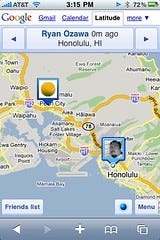
In the beginning, the "where" was enough.
For many, Dodgeball was the first social geolocation app to show potential. And Google saw that potential, acquiring the company in 2005. Sadly, like many Google acquisitions, Dodgeball stagnated in limbo for far too long while competitors leapfrogged ahead, and the service was finally killed in January before ever getting the chance to shine. They also killed Jaiku, which I liked and saw as a decent competitor to Twitter.
Now, Google's giving geolocation another shot with Latitude. There are apps (Blackberry, Android, Windows Mobile, etc.), but you have to use a web interface for the iPhone. For the moment, though, Google's "social strategy" is still in flux, and there's not much else you can do with Latitude besides see your friends on a map.
Plazes
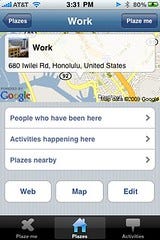
One of the first geolocation applications I used was Plazes, based in Germany. The initial focus of the service was on Wi-Fi hotspots and basic IP geolocation -- that is, figuring out where you were based on your connection to the Internet. When you logged onto the website, it guessed at your location, and encouraged you to refine it.
Over time, Plazes would have information on your usual haunts, as well as nearby coffee shops and offices, so "checking in" became a one-click affair. There was even a desktop application -- how quaint! And there was a client for Nokia phones.
But Plazes took far too long to jump over to the GPS-savvy iPhone, and by the time Nokia acquired them, I'd forgotten all about them. I recently installed the app (my Plazes profile is here), and it felt like a ghost town.
Loopt
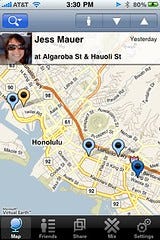
I suspect the largest location-centric social network is Loopt. Unlike most of the services out there (which started on the web and moved onto devices), Loopt started in the mobile handset space. It runs on smartphones across carriers (Verizon, AT&T, Sprint, etc.) and now offers applications for the iPhone, Blackberry, and Android.
Unfortunately, its handset heritage brings with it some quirks: the web interface is pretty rough, for one. Secondly, and more problematic for me, Loopt is tied to your mobile number. So you can only connect with people who know your phone number, and whose numbers you know.
This obviously limits the size of the network you can interact with, but I can see how that could be a positive. Just save Loopt for the people you already have in your address book. I guess I'm probably weird in that I'm more willing to share my location than my phone number... but that's due in large part to the fact that I hate phones in general. The "phone" part of my iPhone is its least used feature.
BrightKite
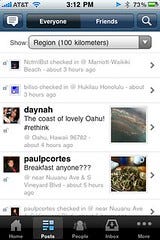
Twitter was well on its way to taking over the majority mindshare of the global geek corps in April 2008. And that's when Brightkite started handing out its first invites (and I prowled the web high and low until I got one two weeks later). Hardcore Twitter users were already posting messages about, and photos of, the places they went. So Brightkite seized on that natural urge. Instead of just Tweeting about getting breakfast at the corner coffeeshop, you could use Brightkite to share a map, comment, and photo, with one link.
Brightkite wisely started off "device and carrier agnostic," with a sharp web interface and a mobile version that worked for almost every phone. And Brightkite also had SMS support out of the gate, so you could receive immediate notifications of your friends' activities (or nearby users).
Like many web services that are thriving today, BrightKite is often seen as an extension to Twitter as much as it is its own social network. But I've always felt Brightkite could stand alone as a straightforward way to track both the activity and movements of your network, with the added benefit of threaded comments and photo sharing. For many reasons, I'd still recommend it.
Unfortunately, after a somewhat disastrous upgrade to Brightkite 2.0, things haven't been quite the same. For all the improvements, I think they took a big step backwards with their web and iPhone app user interface (and I'm not alone). Meanwhile, for many, it's no longer enough to merely know where everyone is located. Now, people want to play, and win, at getting around.
My Brightkite profile is here.
Foursquare
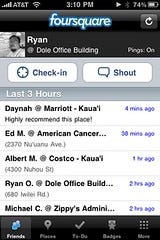
The hot service of the moment is Foursquare. It's the heir apparent to Dodgeball, declared "The Breakout Mobile App" at SXSW this year. (Twitter's march to dominance began at SXSW in 2007.) Like all of the geolocation services that came before, you still check in and share when you arrive somewhere. Foursquare also lets you add "tips" to places that are revealed when people check in (i.e. "Try the cheesecake!"). But Foursquare is also a social game. You earn "badges" and "points" for specific combinations of activity (consecutive nights out and about, number of spots visited in a month, and so on). If you visit a place often enough, you become a "mayor." Thanks to GPS, you actually have to be at the location to check in and earn points. (On Brightkite, I could check in at the Eiffel Tower if I wanted to.)
There's surprisingly fierce competition to become the "mayor" of each town's hotspots. And already some businesses are working with FourSquare to offer deals to users, encouraging people to patronize their establishments (offering, say, 10 percent off if you check in and show them your phone, or 20 percent off if you're the mayor).
There are some quirks. Like Loopt, Foursquare started on mobile devices, so the website often feels like an afterthought. And unlike most geolocation apps, Foursquare relies heavily on street addresses. Most other services would know the difference between the Macy's end of Ala Moana and the Sears end -- locations that are a fair distance apart. On Foursquare, they're the same place.
But the number one limitation of Foursquare is that it only works in certain cities. Nearly 40, as of this posting, but Honolulu is not yet among them. You can still play with Foursquare by pretending to be in a supported city (I've joined several other Hawaii users in Los Angeles), but obviously it's not ideal. Many local geeks have been suggesting Honolulu, and the Foursquare team said yesterday that Honolulu is definitely coming soon. Still, part of me is miffed to even have to ask, no doubt playing into Foursquare's plans to build buzz via manufactured scarcity.
Fortunately, there are other services with similar "game" models.
My Foursquare profile is here.
GraffitiGeo
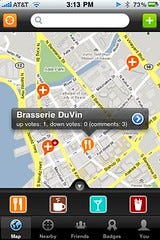
A more open (but iPhone only) attempt is GraffitiGeo. It's a curious mix of elements from Foursquare, Digg, Twitter and Yelp. You can check in and become the "CEO" of a location. You can simply vote locations up or down, or add short "tags" (one-line reviews). One extra? You can form "mobs" with other users and claim "territories" in a city.
But the UI is very barebones (and the app keeps crashing on me), and the "social" connections are all offloaded to Facebook to manage. Still, GraffitiGeo was just acquired by Loopt, so perhaps they're on to something. Hungry as I was for something like Foursquare, I've had fun with it.
My GraffitiGeo profile is here.
Gowalla
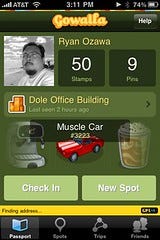
Finally, there's Gowalla, which is my current favorite. I admit, a huge part of the appeal can be summed up as "eye candy." Gowalla is run by Alamofire, a "digital collectibles company" that has parlayed its incredible design talent into a collectible card game on Facebook and, here, a great looking geolocation app. But while they suck you in with a brilliant user interface with gorgeous icons, there's a lot going on under the hood.
As with the other services, you can create spots, check in, and add comments. Your checkins and comments can be posted to Twitter and Facebook. You can easily see a stream of your friends' activities. Spots have "top users," rather than a "CEO" or "mayor." Each location has a pretty "stamp" for your virtual passport, and instead of "badges," you earn "pins" for completing certain achievements. And the iPhone app just added background notifications, so I can find out immediately when a friend turns up at the neighborhood Zippy's.
But a fun, differentiating feature is the addition of "items," or virtual prizes or tokens. When I check into a spot, I can drop an item (say, some candy or a toy train), and a future visitor can pick it up, or swap it for something they have. And thus, everything comes full circle, because Gowalla reminds me of geocaching. These items are like the "travel bugs" that geocachers move around the globe. Even though it's only a half-baked feature now, it will be interesting to eventually see how a specific virtual item moves about a city, and who interacts with it.
I've also found Gowalla's geolocation tools to be first-rate. You can refine the placement of a new location on the map (regardless of address, or even for places without addresses, like lookout spots on hiking trails), for one. But you can also also the radius within which a check in will register. So, a small coffee shop could have a very small footprint, but you could also create a location that encompasses an entire park, or shopping center.
My Gowalla profile is here.
Epilogue
Obviously, getting into geolocation and adding a "where" dimension to social networks can be just as scary as it is fun. There's a lot of commentary out there about how people are recklessly giving up their privacy, or even threatening their own safety, as they publish their whereabouts on the web. Still, I like that services like these are encouraging people to do something many assume geeks avoid: getting out of the house and meeting actual people.
Though you probably wouldn't believe it, I have a loner streak in me that, left unchecked, would probably have me hiding in a mountain cabin, caring for twenty cats while I typed angry manifestos on a manual typewriter. Fortunately, since the advent of "online communities" -- going back to dial-up BBSes -- I've also considered the "social" side of technology to be among its most promising aspects. Now, even though I'm sometimes forcing myself, I'm meeting with, interacting with, and learning from people from all walks of life. People that I probably wouldn't have even known existed without the web.
So I think "where are you" is a good thing, on balance. If only because I'm more motivated than ever to try and have an interesting answer to the question.




